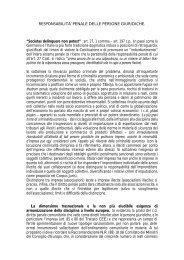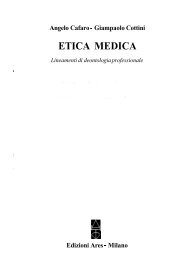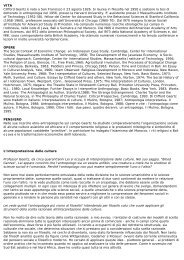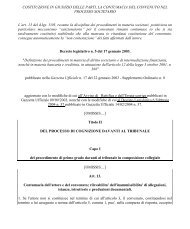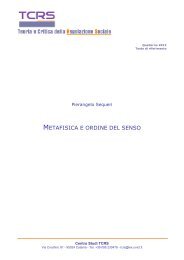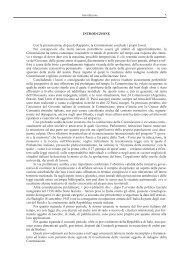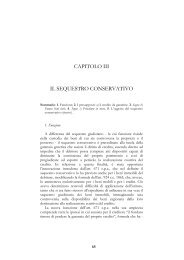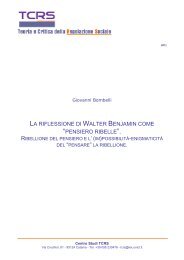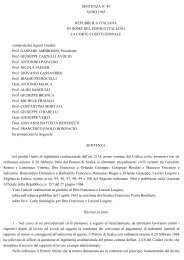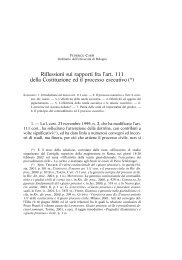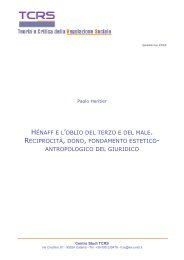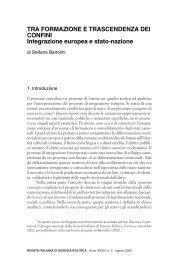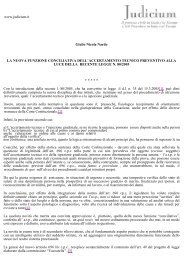FOGLI DI LAVORO per il Diritto internazionale 3 ... - Giurisprudenza
FOGLI DI LAVORO per il Diritto internazionale 3 ... - Giurisprudenza
FOGLI DI LAVORO per il Diritto internazionale 3 ... - Giurisprudenza
You also want an ePaper? Increase the reach of your titles
YUMPU automatically turns print PDFs into web optimized ePapers that Google loves.
<strong>FOGLI</strong> <strong>DI</strong> <strong>LAVORO</strong> <strong>per</strong> <strong>il</strong> <strong>Diritto</strong> <strong>internazionale</strong> 3/2008<br />
Parties with clearly negative and defamatory connotations, as<br />
submitted by the third party (see paragraph 78, below). This did<br />
not, however, apply in the instant case.<br />
3. The third party's submissions<br />
78. The Helsinki Foundation submitted that the labelling of<br />
religious groups as “sects” or “cults” was widespread in Poland<br />
and other European countries. They considered that the term<br />
“sect” had an unclear meaning and a clearly negative<br />
connotation and should be regarded as defamatory when used by<br />
public officials. Consequently, such labelling should be<br />
considered as indirect interference which could not be justified<br />
as it was not necessary in a democratic society.<br />
4. Assessment by the Court<br />
79. The Court reiterates at the outset that a Church or an<br />
ecclesiastical body may, as such, exercise on behalf of its<br />
adherents the rights guaranteed by Article 9 of the Convention<br />
(see Cha'are Shalom Ve Tsedek v. France [GC], no. 27417/95, §<br />
72, ECHR 2000-VII). In the present case the first and second<br />
applicant associations may therefore be considered applicants<br />
for the purposes of Article 34 of the Convention.<br />
80. Wh<strong>il</strong>e religious freedom is primar<strong>il</strong>y a matter of<br />
individual conscience, it also implies, inter alia, freedom to<br />
manifest one's religion, alone and in private, or in community<br />
with others, in public and within the circle of those whose faith<br />
one shares. Article 9 lists a number of forms which<br />
manifestation of one's religion or belief may take, namely,<br />
worship, teaching, practice and observance. Furthermore, it<br />
includes in principle the right to try to convince one's neighbour,<br />
for example through “teaching”, fa<strong>il</strong>ing which, moreover,<br />
“freedom to change [one's] religion or belief”, enshrined in<br />
Article 9, would be likely to remain a dead letter (see, amongst<br />
many authorities, Kokkinakis v. Greece, judgment of 25 May<br />
1993, Series A no. 260-A, p. 17, § 31, and Buscarini and Others<br />
v. San Marino [GC], no. 24645/94, § 34, ECHR 1999-I).<br />
Nevertheless, Article 9 does not protect every act motivated or<br />
inspired by a religion or belief (see, amongst many other<br />
authorities, Kalaç v. Turkey, judgment of 1 July 1997, Reports<br />
199



